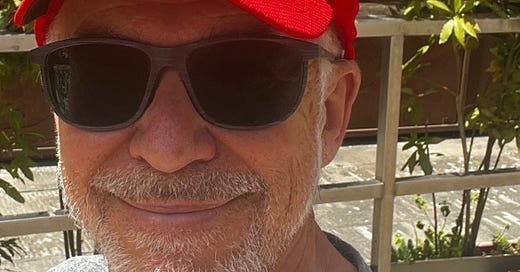Why Settle for Retirement When You Can Have Jubilation?
The Retirement Journey: Insights for Those Planning or Living the Experience
Now that Christmas festivities are behind us, I like to take some time to look at the year ahead, obviously savouring a cappuccino from my Pavoni espresso machine in St-Sauveur. I like to look at the big picture of things, not necessarily in details. Places I like to visit and things I would like to do.
Retirement has completely reshaped my days—it’s a different rhythm, a different mindset. Back when I was working, life moved faster. Speaking of retirement, I’d love to share a sneak peek from a chapter of my “work-in-progress” book, where I dive into this very topic.
We all have different views on the matter and realize that there is no right or wrong way of dealing with it. Some delay retirement until health leaves them no choice; others will work till the very end of their life. And then there are those who spend years eagerly counting down to this stage.
I’ve often found myself pondering and perhaps analyzing the subject at length, and I’m happy to share with you my findings and thoughts.
In the grand scheme of things, life can often be seen as having three stages:
1) Development Stage:
Development stage (0-19 years) – This takes place in many substages such as Infancy, Childhood, Adolescence, and Young Adulthood. This stage is for Learning and Exploration: It continues with the Young Adulthood (20–35 years) Often marked by pursuing education or career goals, forming relationships, and building a sense of purpose and stability.
2) Production Stage:
Adulthood and Middle Age. Responsibility and Contribution: perhaps a time for nurturing families, advancing in careers. Focus shifts to personal fulfillment and legacy-building.
3) Retirement Stage:
Retirement Freedom and Reinvention: A stage to pursue passions, enjoy leisure, and deepen relationships while adapting to a slower pace of life.
We all pass through the first two stages of life without much debate. Retirement, though—that’s a different story. It’s not a neat chapter with clear rules.
Some of us dive into it with excitement, seeking new purpose and adventures. Others might feel a bit lost, unsure of how to fill their days. A lot of it comes down to two things: personality and needs.
Personality shapes whether we see retirement as an opportunity or an obstacle, while our needs—financial, emotional, and practical—often decide when and how we can actually step into this stage.
Retirement isn’t a one-size-fits-all experience. It’s as unique as we are, guided by what we value most and how we choose to spend our time.
So, what really happens when we do retire?
Retirement isn’t just about leaving a job—it’s an emotional journey, one that many of us experience in phases. While everyone’s path is unique, these six stages often show up in some shape or form:
1. Anticipation (Pre-Retirement Phase)
Excitement, eagerness, maybe a dash of anxiety.
This is the dreaming stage. We picture lazy mornings, spontaneous trips, and no emails to answer. Yet, it’s also the phase where questions creep in: Will I have enough money? Who will I be without my work identity?
2. Honeymoon Phase (Early Retirement)
Euphoria, liberation.
Freedom at last! Days are filled with hobbies, travel, or simply the joy of waking up with no alarm clock. It’s exhilarating—like an extended vacation. But eventually, the novelty can fade.
3. Disenchantment
Boredom, loneliness, loss of purpose.
When the vacation feeling wears off, some retirees hit a slump. Without the structure of work or a clear sense of purpose, days can start to feel aimless. This stage can be challenging, but it’s also a turning point.
4. Reorientation
Hopefulness, curiosity.
Here’s where things start to shift. Retirees begin to carve out new routines, find meaningful activities, volunteer, learn new skills, or dive into long-neglected passions.
5. Stability (Routine Establishment)
Contentment, satisfaction.
Life settles into a steady rhythm. There’s a comforting balance—busy enough to feel engaged, calm enough to enjoy the little moments. This is often where the real joy of retirement shines through.
6. Reflection and Acceptance
Gratitude, peace, nostalgia.
In this final stage, there’s time to look back, celebrate accomplishments, cherish relationships, and find peace with the passing years. It’s a phase rich with meaning and quiet contentment.
So, as you see retirement isn’t a straight path—it’s more of a winding road. Each stage offers something valuable, and embracing them with openness can make all the difference.
Redefining Purpose
I’m happy to say I’m finally at stages five and six but it did not come easy. I struggled with steps three and four. After 40 years in the corporate world, I had to redefine who I was. I believed I had built many friendships, yet few people picked up the phone once I was out of the loop. Who was I, really, without my suit and tie? At 59, I felt too young to let go and too old to start over.
After a few false starts, I thought I had finally found my path in 2015. However, after months at home, the hobbies and activities I had envisioned—yoga, Tai Chi, classical guitar lessons, painting, university courses, serving on three different boards, playing pickleball, biking or skiing —still left me unfulfilled. Despite keeping busy, an undeniable void remained.
I realized I wasn’t ready for retirement. A fire still burned inside me—a longing to engage in something that would make my days feel truly worthwhile and meaningful or perhaps feeling productive in a less personal way.
From leisurely busy to productive busy
I always enjoyed sharing knowledge, guiding, and mentoring others. So, I asked myself, why not teach a class at Life Long Learning (LLL) at McGill University? But what subject? What did I know well enough to teach? Real estate was the one area where I had deep experience, and the idea of passing that knowledge on felt meaningful. However, with the average age of LLL attendee over 70, I wondered, what could they gain from a real estate class?
Then it struck me: Downsizing. The transition from a family home to a smaller house, a condo, or a retirement community involves not just financial planning, but emotional readiness—letting go of cherished spaces and belongings. So, I designed a course outline, submitted it to the university, and was thrilled when it was accepted. For three years, I taught full classes, guiding students through the complexities of this significant life transition.
Teaching that course revealed a need for downsizing guidance. Inspired, I founded DOMA, an advising company dedicated to helping people navigate this challenging stage of life. Building the company from scratch was exciting, but just as I was ready to launch, a lucrative opportunity arose—a role as an exclusive advisor and agent for emigrants in the Quebec Immigration Investor Program. I decided to put DOMA on hold and embraced this new venture wholeheartedly.
Then the pandemic hit. The forced pause became an unexpected gift, giving me time to reflect, reassess, and dive deep into introspection. I was single, nearing 70, and ready to face my next chapter with clarity. As the world began to reopen, I set out for Tuscany—partly to bike, but mainly to embark on a transformative 16-day pilgrimage. That journey reshaped my perspective on life. For the first time, I felt ready to embrace retirement fully, not as an end but as a rich and open stage of life brimming with possibilities. (a newsletter will follow on the Pilgrimage that changed my life)
“Happy as a clam”, he says
Over lunch with my retired friends, I asked them where they felt they were in the six stages of retirement. My friend Jim gave a memorable answer: “Well, I left the office on a Friday at 5 PM, and by the time I got home, I had already forgotten about work. I went from stage two to stage six. Happy as a clam!” “and never looked back”
I admired his ease in embracing retirement, yet I wasn’t disappointed by my own journey through the trials and errors of the other stages. They taught me invaluable lessons about myself and what truly matters in this chapter of life.
I prefer Jubilation.
The term "retirement" carries connotations of stepping back, withdrawing, or even fading away. Its origins in the French retire — to withdraw — only reinforce this sense of retreat. Yet, this doesn’t align with the vibrant reality of what this stage can truly represent.
For many today, "retirement" isn’t about disengagement—it’s about redirection. It’s a chapter brimming with opportunities to pursue passions, contribute to communities, travel, learn, and grow. It’s less an ending and more a renaissance.
Yes, renaissance — a word that captures renewal, creativity, and discovery. Just as the cultural Renaissance sparked innovation and transformation, a personal renaissance can become a time to deepen connections, reinvent oneself, and embrace what truly matters.
Imagine if, instead of asking, “When are you retiring?” we asked, “What’s your renaissance about?”
Other languages already hint at this shift:
Spanish - Jubilación, rooted in jubilare — to shout for joy. Retirement as a jubilee, a celebration.
German - Ruhestand, meaning state of rest — a gentle transition into peace and reflection.
Japanese - Taishoku, to withdraw from work, with an air of intention and purpose.
Chinese - Tuìxiū, stepping away from work to embrace rest and personal fulfillment.
Perhaps it’s time we embraced a new term, one that reflects growth rather than retreat. Maybe even Renaissaging — a blend of renaissance and aging — a stage defined by joy, curiosity, and forward momentum.
"It’s not when one retires that matters, nor what they’ll do, or even how they’ll do it. What truly matters is embracing this stage fully—inhabiting it with intention and savouring moments that won’t come again. Above all, it’s about cherishing the irreplaceable bonds of friendship and family."
Happy Renaissaging!
"You have to divide life into stages, and each stage will be what you make of it. If you're convinced that it's not worth doing anything, you'll be bored for the 40 years you have left to live."
— Janette Bertrand (99 yrs old Quebec Journalist and actress)








Merci Francois, j’ai peur que l’entrepreneur en moi commence à donner des séances sur la retraite si je m’expose trop. Lol 😂
What a great post Tino. I retired 26 1/2 years ago and for the first few months I missed the camaraderie, but soon got over that. I was lucky in that the group of people I worked with still keep in touch today. I thoroughly enjoyed the freedom I had, and became known as “lady lunchalot”, but when my husband retired 3 years later we moved to live on Phillip Island in our holiday home. Such bliss, we had the garden I had always wanted, walked on the beach, welcomed our first grandchildren, travelled extensively, eventually bought a boat and went fishing and then I discovered I actually enjoyed painting, which is where my art journey began, and I’ve read dozens and dozens of books. I sourced all of our family history, wrote books about it then started writing on Wordpress and Substack. So as you can see I have filled in those years successfully, not a bored moment. Not that I expect another 26 years, but I intend to fill every minute. Time to get out into the kitchen now 😄